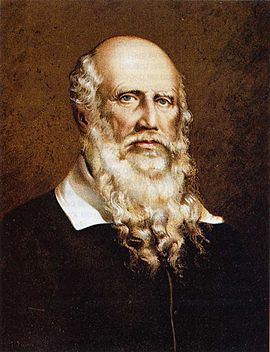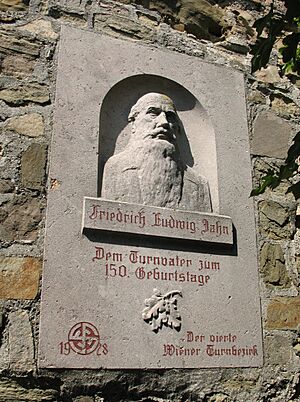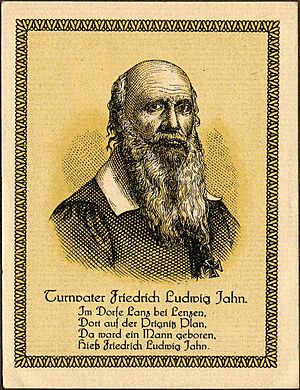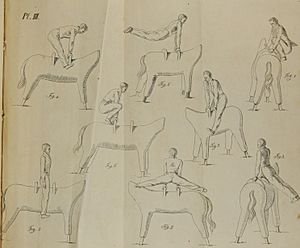Friedrich Ludwig Jahn facts for kids
Quick facts for kids
Johann Friedrich Ludwig Christoph Jahn
|
|
|---|---|
 |
|
| Born | 11 August 1778 Lanz, Province of Brandenburg, Prussia
|
| Died | 15 October 1852 (aged 74) Freyburg, Province of Saxony, Prussia
|
| Nationality | German |
| Other names | "Turnvater Jahn" |
| Occupation | Gymnastics educator and nationalist |
Johann Friedrich Ludwig Christoph Jahn (born August 11, 1778 – died October 15, 1852) was a German teacher who helped create the sport of gymnastics. He is also known for his strong belief in German nationalism. Many people credit him with starting the German gymnastics movement, known as the Turners. He also played a role in the German Campaign of 1813. This was when German states worked together to end Napoleon's control over their lands. His fans called him "Turnvater Jahn", which means "Father of Gymnastics Jahn".
Contents
Jahn's Early Life and Education
Jahn was born in a small village called Lanz in Brandenburg, Prussia. He studied different subjects like theology (the study of religion) and philology (the study of language and literature). He attended universities in Halle, Göttingen, and Greifswald from 1796 to 1802.
After a major battle in 1806, he joined the Prussian army. In 1809, he moved to Berlin. There, he became a teacher at two schools: the Gymnasium zum Grauen Kloster and the Plamann School.
Starting the Gymnastics Movement
Jahn was very upset about Napoleon's control over his home country. He believed that Germans needed to feel strong and proud again. He thought that physical exercise and good morals could help them. This idea led him to create the gymnastics movement.
In 1811, Jahn opened the first Turnplatz. This was an outdoor gym in Hasenheide, south of Berlin. Soon, the Turnverein (gymnastics association) movement grew very quickly. Young gymnasts were taught to see themselves as part of a group. Their goal was to free their homeland. Jahn's writings greatly encouraged this strong national spirit.
Involvement in Wars and Politics
In 1813, Jahn actively helped form the famous Lützow Free Corps. This was a group of volunteers in the Prussian army who fought against Napoleon. He led a part of this group. He also often worked in secret service during this time.
After the war, he returned to Berlin. He was made a state gymnastics teacher. He also helped create student patriotic groups called Burschenschaften in Jena.
Challenges and Later Life
Jahn was a very strong-willed and outspoken person. He often disagreed with the authorities. The government eventually realized that he wanted to create a united Germany. They saw his Turner schools as political and liberal clubs.
This led to the closing of the Turnplatz in 1819. Jahn was arrested. He was held in different places until 1824. He was sentenced to two years in prison. However, this sentence was overturned in 1825. But he was not allowed to live within ten miles of Berlin.
So, he moved to Freyburg on the Unstrut river. He lived there until he died. For a short time in 1828, he was sent away to Kölleda. This was because he was accused of trying to cause a rebellion. While in Freyburg, he was invited to be a professor in America. He refused, saying he preferred to stay where he was.
In 1840, the Prussian government honored Jahn. They gave him the Iron Cross for his bravery in the wars against Napoleon. In 1848, he was chosen to be a member of the German National Parliament. Jahn passed away in 1852 in Freyburg. A monument was built there in his honor in 1859.
Jahn made popular the four Fs motto: "frisch, fromm, fröhlich, frei". This means "fresh, pious, cheerful, free".
Jahn's Writings
Jahn wrote several books about his ideas. Some of his works include:
- Bereicherung des hochdeutschen Sprachschatzes (1806)
- Deutsches Volkstum (1810)
- Die Deutsche Turnkunst (1816)
How Jahn Changed Physical Education
Jahn encouraged the use of equipment like parallel bars, rings, and the high bar in gymnastics. These are still used in competitions today.
Many gymnastics clubs, called Turnvereine, were named after him to honor his memory. One famous club is the SSV Jahn Regensburg.
Gymnastics classes based on Jahn's Turnplatz ideas began in the United States in 1825. German experts Charles Beck and Charles Follen, along with American John Neal, helped spread these ideas. Beck opened the first gym in the U.S. in 1825. Follen opened the first college gym at Harvard College in 1826. Neal opened the first public gym in Portland, Maine, in 1827. Neal also wrote about Jahn's ideas, helping the movement grow in America.
There is a monument to Jahn in St. Louis, Missouri. It is in Forest Park. The monument has a large statue of Jahn's head. It also has statues of a male and female gymnast. A plaque calls him "The Father of Systematic Physical Culture".
Other memorials to Jahn can be found in Groß-Gerau, Germany; Vienna; and Cincinnati, Ohio. An elementary school in Chicago is also named after Jahn.
Criticisms of Jahn's Views

In his time, Friedrich Jahn was seen as someone who wanted more freedom and change. He believed that the German states should unite after Napoleon's armies left. He also wanted a democratic government with free speech.
As a German nationalist, Jahn wanted to protect German language and culture. He was concerned about foreign influences. During the time when German states were occupied by Napoleon, he sometimes expressed very strong views against groups he saw as foreign influences. He was also a leading figure in a student book burning event in 1817.
Later, some scholars began to look closely at Jahn's ideas. In the 1920s and 1930s, some people, including those connected to National Socialism (Nazis), tried to link Jahn's ideas to their own. They said that Jahn's gymnastics was meant to create a perfect German citizen.
After World War II, some writers, like Peter Viereck, claimed that Jahn was a spiritual founder of Nazism. They said he inspired early German romantics with ideas that were against certain groups and supported strong control. However, other scholars, like Jacques Barzun, disagreed. They argued that this view of Jahn was not accurate and misunderstood his true beliefs.
See also
 In Spanish: Friedrich Ludwig Jahn para niños
In Spanish: Friedrich Ludwig Jahn para niños
- Turners
 | Chris Smalls |
 | Fred Hampton |
 | Ralph Abernathy |



